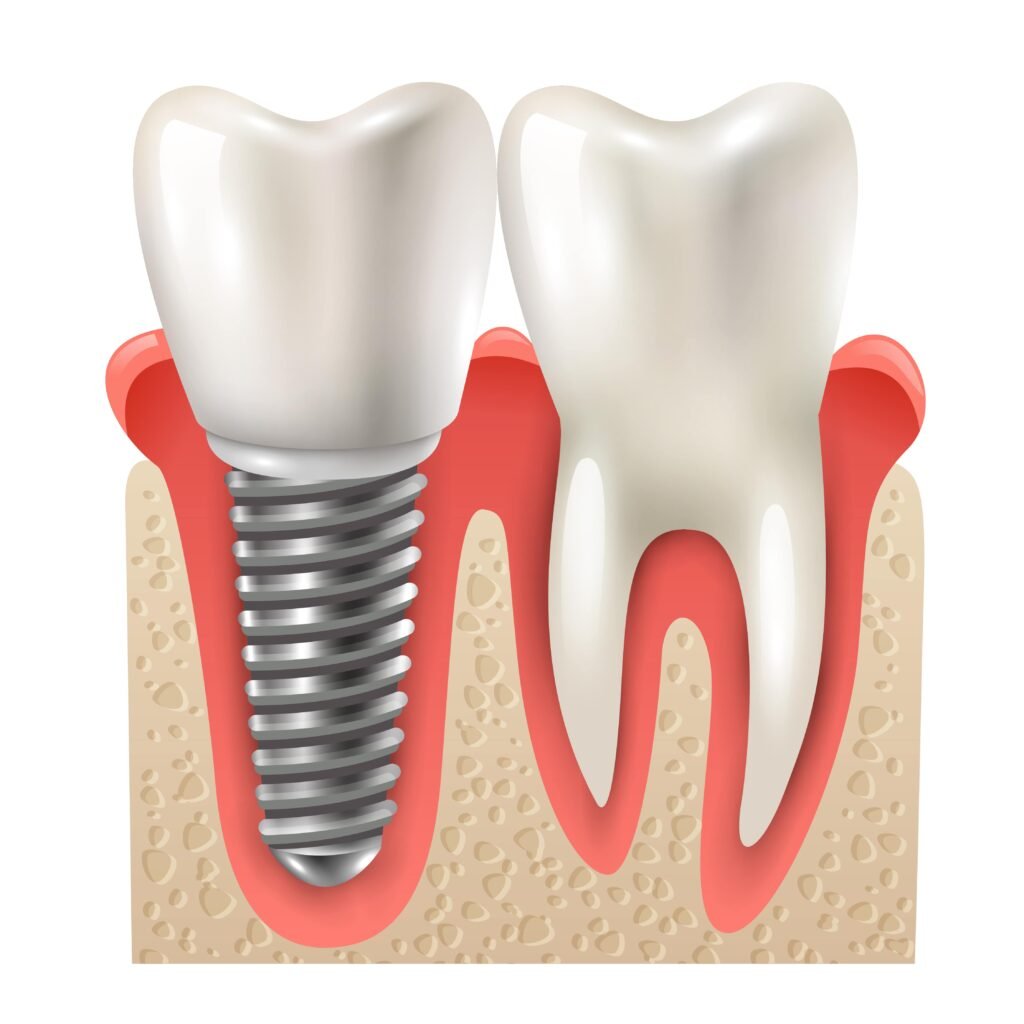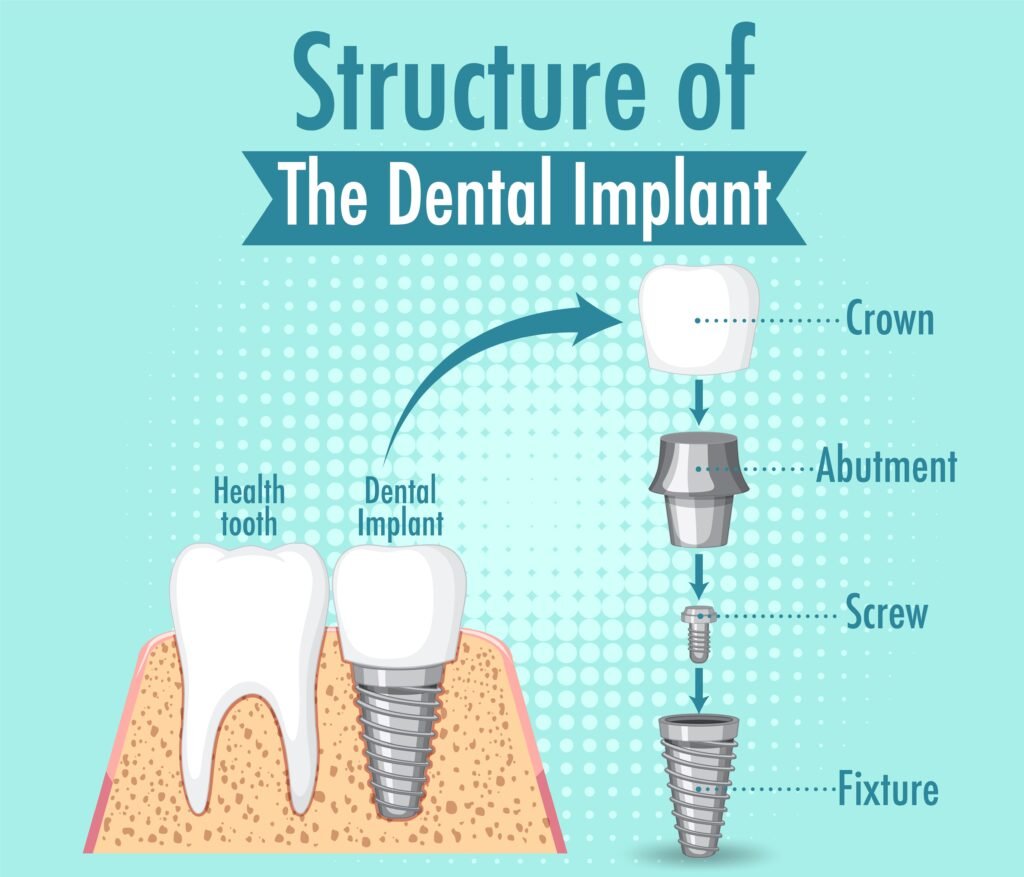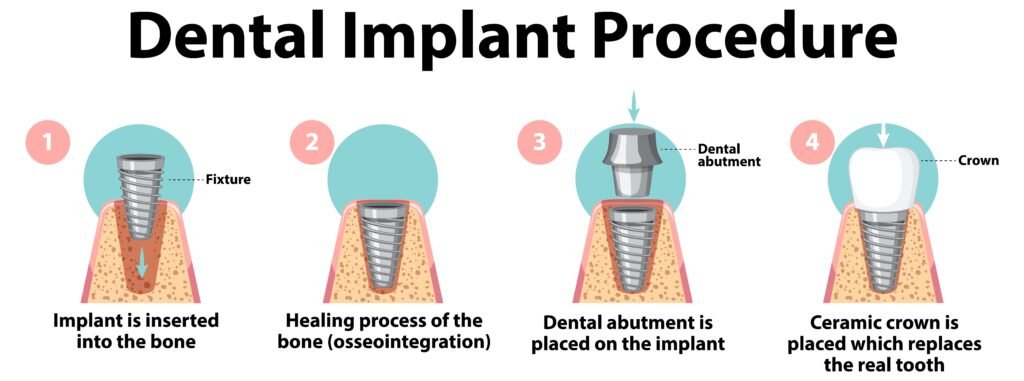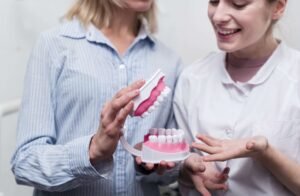When patients first research dental implant parts, they often discover a sophisticated system of precision dental implant components working in harmony. Understanding the different parts of dental implants—from the foundational fixture to the connecting abutment and final crown—is essential for appreciating how modern tooth replacement works. This comprehensive dental implant parts guide explores every piece of the system, explaining the 3 parts of an implant and how each one contributes to a functional, natural-looking smile. Whether you’re looking at a dental implant parts diagram or learning about the parts of a dental implant system, this resource will give you the confidence that comes from truly understanding your treatment.
Table of Contents
ToggleThe 3 Fundamental Parts of Every Dental Implant
All dental implants consist of three primary components that work in harmony:
TABLE: Dental Implant Components Comparison
| Component | Primary Function | Material Options | Key Features | Longevity |
|---|---|---|---|---|
| Fixture | Serves as artificial root | Medical-grade titanium | Threaded design, surface-treated | Lifetime |
| Abutment | Connects fixture to crown | Titanium, Zirconia | Custom or stock designs | 15+ years |
| Crown | Visible tooth replacement | Porcelain, Ceramic | Color-matched, custom-shaped |
Explore Our Interactive Dental Implant Diagram
across-section showing implant in jawbone with these clickable elements:
Fixture: “Titanium screw that integrates with your jawbone”
Bone Threads: “Specialized threading maximizes stability”
Abutment: “Connector that joins fixture to crown”
Abutment Screw: “Precision fastener secured with exact torque”
Crown: “Custom-made visible tooth replacement”
Gum Tissue: “Healthy gums heal around the abutment”]
Detailed Breakdown: Understanding Each Component
The Implant Fixture: Engineering Excellence
Why Design Matters:
Macro-threads: Provide immediate mechanical stability during healing
Micro-threads: Preserve crestal bone for long-term gum health
Platform Switching: Advanced design reduces bone loss around implant neck
Surface Treatment: Special coatings accelerate bone integration
Clinical Insight from Dr. Yilmaz:
*”The fixture’s surface technology is what makes modern implants so successful. Our titanium surfaces are specially treated to attract bone cells, cutting healing time by 30-40% compared to older designs.”*
The Abutment: Where Precision Meets Aesthetics
Material Choices Explained:
Titanium Abutments: Ideal strength for back teeth, proven long-term reliability
Zirconia Abutments: Perfect for front teeth, eliminate gray show-through gums
Titanium-Base Zirconia: Combines strength with optimal aesthetics
Attachment Methods:
Screw-Retained:
Advantage: Easier maintenance and repair
Consideration: Screw access may affect biting surface
Cement-Retained:
Advantage: Superior aesthetics and simpler design
Consideration: Requires meticulous cement removal
The Crown: Your Custom Restoration
Crafting Your Perfect Crown:
Digital shade matching for invisible integration
Customized biting surfaces for natural function
Strength-tested materials withstand chewing forces
Lifelike translucency and characterization available

The Complete Treatment Timeline: When Each Part is Used
Stage 1: Surgical Placement
Fixture placed in jawbone
Healing cap attached
Healing period: 3-6 months for osseointegration
Stage 2: Impression Phase
Healing cap removed
Impression post placed
Digital or physical impression taken
Lab analog used for model creation
Stage 3: Final Restoration
Final abutment torqued into place
Crown cemented or screwed
Bite adjustment and polish
Follow-up care instructions

Advanced Components: Supporting Parts Explained
Healing Abutments: Guiding Tissue Formation
Purpose: Temporary component that shapes gum tissue during healing
Design: Various diameters match your final crown size
Benefit: Creates natural-looking gum contours for optimal aesthetics
Impression Components: Ensuring Perfect Fit
Impression Coping: Transfers exact implant position to model
Lab Analog: Replicates your implant in the dental laboratory
Guide Pins: Secure components during impression process
Potential Problems and Solutions: What You Should Know
Common Issues and Their Resolution
“My implant crown feels loose”
Likely Cause: Loose abutment screw
Solution: Simple in-office tightening with torque wrench
Prevention: Regular maintenance checks
“My implant crown cracked”
Likely Cause: Porcelain fracture from heavy biting forces
Solution: Crown replacement; fixture and abutment usually unaffected
Prevention: Night guard if you clench or grind
“Redness or swelling around implant”
Likely Cause: Peri-implantitis (inflammation around implant)
Solution: Professional cleaning and possible medication
Prevention: Meticulous oral hygiene and regular check-ups
Dr. Yilmaz Notes:
“Most implant complications are manageable when caught early. The modular design means we can often replace just one component rather than the entire implant system.”
The Ultimate Selection Guide: Choosing Your Components
Abutment Material Decision Matrix
Choose Titanium When:
Replacing back teeth where strength is paramount
Budget considerations are important
Gum tissue is thick and hides graying
Choose Zirconia When:
Replacing highly visible front teeth
You have thin or translucent gum tissue
Optimal aesthetics are the top priority
Crown Attachment Method Guide
Screw-Retained Advantages:
Easier professional maintenance and repair
No cement-related complication risk
Predictable retrievability
Cement-Retained Advantages:
Superior aesthetic outcome
Simpler mechanical design
No screw access hole compromises

Why Component Knowledge Matters for Your Treatment Success
Informed Patients Make Better Decisions
Understanding dental implant parts helps you:
Ask better questions during consultations
Understand the value behind material choices
Appreciate the engineering behind your restoration
Maintain your investment properly for long-term success
Optimal Outcomes Through Understanding
Knowledge leads to:
Realistic expectations about procedures and timelines
Better home care and maintenance routines
Early problem identification and intervention
Greater satisfaction with your final result
Kristal Clinic's Precision Approach to Implant Components
Advanced Digital Workflow
At Kristal Clinic, we leverage cutting-edge technology for perfect component selection and placement:
3D Digital Scanning: Precise measurements for ideal component matching
CAD/CAM Technology: Custom abutment and crown fabrication
Surgical Guides: Perfect fixture placement every time
Digital Bite Analysis: Optimal crown design for your unique bite
Premium Component Partnerships
We work exclusively with top-tier manufacturers:
Straumann®: Swiss precision and proven reliability
Nobel Biocare®: Innovation leaders in implant dentistry
Zimmer Biomet®: Comprehensive restorative solutions
Dr. Yilmaz Explains Our Philosophy:
“We don’t believe in one-size-fits-all implant solutions. By understanding each patient’s unique bone structure, aesthetic demands, and functional needs, we select and customize components that will deliver not just a tooth, but a seamless integration that feels and functions like nature intended.”
Ready to Understand Your Implant Options?
Now that you’ve seen how dental implant components work together to create a complete tooth replacement system, take the next step toward restoring your smile with confidence.
Schedule your comprehensive implant consultation at Kristal Clinic today and experience the difference that precision component selection makes.
We’ll provide:
3D CBCT scan and digital impressions
Customized component recommendations
Detailed treatment plan and timeline
Flexible financing options

